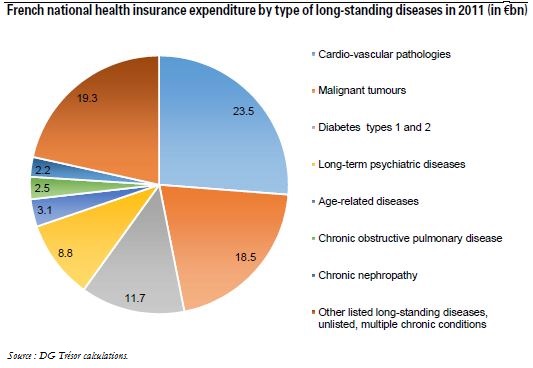Trésor-Economics No. 145 - What is the future of France's healthcare expenditure reimbursement system for patients with long-standing diseases?
Expenditure for patients suffering from a recognized long-standing diseases(Affection de Longue Durée - ALD) currently represents a major share (€90bn in 2011) of total reimbursed healthcare expenditures. The ALD system itself, which supplements standard reimbursements by granting patients copayment exempt status for all medical procedures and services related to LSDs, costs the national health insurance system an additional €12.5bn, but accounts for only a modest 14% of the total reimbursed healthcare expenditure for patients having a recognized LSDs.
Attributable in equal measure to population ageing and the rising prevalence of chronic diseases, over a fifteen year period reimbursed healthcare expenditures are projected to increase by 1.6 percentage points of GDP, reaching 8.3% of GDP in 2025. The share of ALD beneficiaries would thus rise from 15.4% of the population in 2011 to 19.7% in 2025.
The ALD system generates inequalities in patient management and may leave patients with high out-of-pocket expenses. Firstly, because the approach in France is singularly based on medical rather than economic criteria, the ALD system means that two patients facing the same healthcare expenditures could ultimately be reimbursed very different amounts, if one enjoys exempt status under the ALD system and the other does not. Furthermore, the system only partially achieves its goal of limiting annual out-of-pocket expense, given that one patient in twenty still incurs annual out-of-pocket expense for medical care and medical supplies of over €900, which does not take account of either extra-billing, that is, additional fees or extra charges billed for procedures or services covered by the social security system, or coverage by supplementary health insurance. Moreover, ALD beneficiaries, who account for one-third of the one in twenty patients that is nearly twice their percentage of the total population-remain at risk of incurring high out-of-pocket expenses for medical care unrelated to their recognized LSDs.
Incremental improvements to the ALD system are welcome, and some are already under way: checks on the "two-part" prescription form, consistency in the ALD-eligible list of pathologies, and the introduction of a timeframe for ALD coverage. However, these changes cannot fully overcome the system's limits. A more ambitious, comprehensive reform to regulate public expenditure and patients' annual out-of-pocket expense on the basis of parameters to be determined-such as annual out-of-pocket maximum, level of exemption if any, and copayment amounts-could prove to be more appropriate. Management of healthcare expenditure by the mandatory national health insurance system based on economic criteria would thus restore equity among patients irrespective of their medical disease, while preventing excessive annual out-of-pocket expenses.
